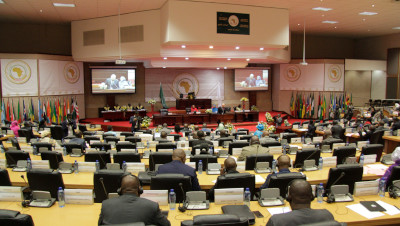
The African Capacity Building Foundation (ACBF), the African Union’s Specialized Agency for capacity building, and the African Export-Import Bank (Afreximbank) have engaged the Pan-African Parliament (PAP), through the Committee on Monetary and Financial Affairs, to consider the adoption of a Model Law on Factoring by African Union (AU) member states.
The Model Law on Factoring was developed by Afreximbank with the support of ACBF and was identified as one of the instruments to enhance its Intra-African Trade Strategy and Industrializationas well as the Export Development Programme under its 5thStrategic Plan,in recognition ofthe increasing opportunities for factoring in Africa. ACBF is collaborating with Afreximbank to develop tailor-made certification programmes on Factoring as well as to support law makers and regulators with various forms of sensitization and outreach campaigns on the Model Law.
Introducing the consultation of ACBF and Afreximbank with PAP, Mr. Bakary KONE, ACBF’s Director for Resource Mobilization, Strategic Planning and Partnerships, speaking on behalf of Prof. Emmanuel NNADOZIE, Executive Secretary of ACBF and Prof. Benedict Oramah, President of Afreximbank, said: “I would like to express the profound gratitude of our two institutions for the opportunity offered by PAP to present Factoring, an instrument that is likely to significantly contribute to addressing trade financing challenges in Africa.”
Mr. Kone added that “despite its importance as a trade finance tool, the use of factoring remains limited in Africa, which in ACBF and Afreximbank’s view is due to a lack of regulatory frameworks and legal instruments at both continental and country levels,” concluding that “we have no doubt that, with your support and after your guidance, the Model Law we present to you today will soon become a reference instrument for Factoring in every African country.”
In his presentation to the PAP Permanent Committee on Monetary and Financial Affairs, Mr. Enga KAMENI, Senior Manager: Legal Services Department at Afreximbank indicated that in the current context of insufficient trade financing resources, Factoring becomes a viable alternative to promote trade on the continent. He defined Factoring as a unique blend of services designed to ease traditional problems of selling on open account terms. Factoring is based on the idea of selling/assigning a business’s outstanding receivables (sales invoices) to the Factor and receiving a set of trade related services.
“One of the constraints impeding the growth of Factoring in Africa has been the absence of a facilitative legal and regulatory environment for factoring to thrive. The Model Law was developed to guide law makers in various African countries in preparing and introducing relevant pieces of legislation in their respective jurisdictions. We will continue to work with ACBF in engaging the PAP in a bid to disseminate and get African Parliamentarians to adopt the Model Law. This has become crucial given an opportunity for factoring through intra-African trade presented by the African Continental Free Trade Area (AfCFTA),” said Mr. Kameni.
Mr. Peter MULROY, Secretary General of Factoring Chain International (FCI), the Global Representative Body for Factoring and Financing of Open Account Domestic and International Trade Receivables, told African Parliamentarians that Africa, the “future” where the Factoring is expected to grow rapidly, adds up to over 24 billion euro with a growth of 10%, largely thanks to the contribution of the older players like South Africa (+12%) and Egypt (+14%).
“World factoring statistics indicate that the Factoring and Receivables Finance Industry volume shows solid growth, with all regions indicating positive trends. The industry found an accelerated gear in 2017 and 2018 with a 9% and 6% increase respectively, and again in 2019 which grew by 5.4%,” said Mr. Mulroy.
Chairperson of the PAP Committee on Monetary and Financial Affairs,Hon.James Reat GONY, welcomed the initiative and the prospect of a Factoring Model Law for the continent. Hon. Gonysignaled his Committee’s commitment to work with ACBF and Afreximbank to finalize the process and ensure that the Model Law is adopted by the PAP Plenary.
“Our Committee is tasked with advising Parliament on economic, monetary and investment policies. Factoring presents a unique opportunity to boost Africa’s trade especially given the rise of the African middle class. We will therefore ensure that the Model Law goes through the appropriate processes which includes the adoption of the report of this meeting, and thorough consultations with stakeholders before its adoption by the PAP Plenary,” said Hon. Gony.
In collaboration with Afreximbank, ACBFhas recently producedand published knowledge products that simplify the Factoring concept andalso present opportunities that come with it.
For ease of reference, the Model Law on Factoring is accessible on the ACBF Virtual Library https://elibrary.acbfpact.org/in both English and French languages.
-ends-
---------------------------------------------------------------------------------------------------------------------------------------For inquiries and more information, please contact:
Ntsiuoa SEKETE (Ms)
Senior Communication Officer,
African Capacity Building Foundation (ACBF),
+27 72 658 9295, N.Sekete@acbf-pact.org
Jeffrey ONGANGA(Mr)
Media Officer Tel: +27 115455000 ext 5307/Mobile: +27 79 074 0005,
jeffrey.onganga@panafricanparliament.org
Follow us @:
Website www.acbf-pact.org
Twitter https://twitter.com/ACBF_Official
Facebook www.facebook.com/ACBFOfficial
About the African Capacity Building Foundation
Established in 1991, ACBF builds human and institutional capacity for good governance and economic development in Africa. To date the Foundation has empowered people in governments, parliaments, civil society, private sector and higher education institutions in more than 45 countries and 6 regional economic communities. ACBF supports capacity development across Africa through mobilization and leveraging of resources for capacity development; grants, investments, and fund management; knowledge services; promoting innovation in capacity development and capacity development advisory services. The establishment of ACBF was in response to the severity of Africa’s capacity needs, and the challenges of investing in indigenous human capital and institutions in Africa. ACBF interventions are premised on four principles: the centrality of capacity to the development process in Africa; the critical role of a partnership and demand-driven approach in tackling capacity challenges; African ownership and leadership in the capacity development process; and a systematic, sequenced and coordinated approach to the capacity development process that pays attention to capacity retention and utilization.
For further information,follow: www.acbf-pact.org





